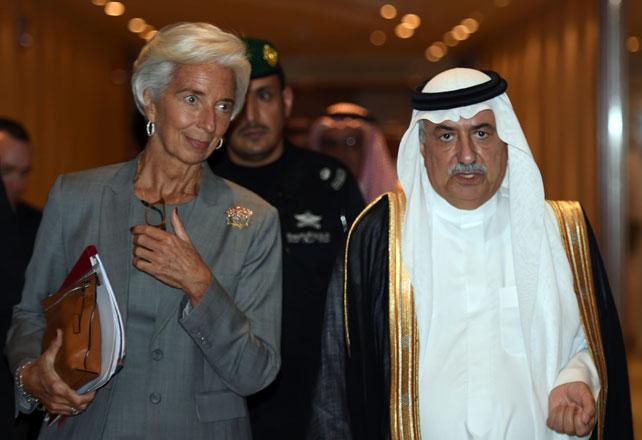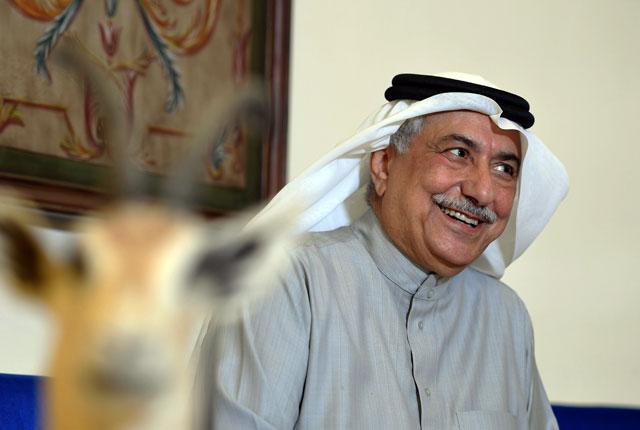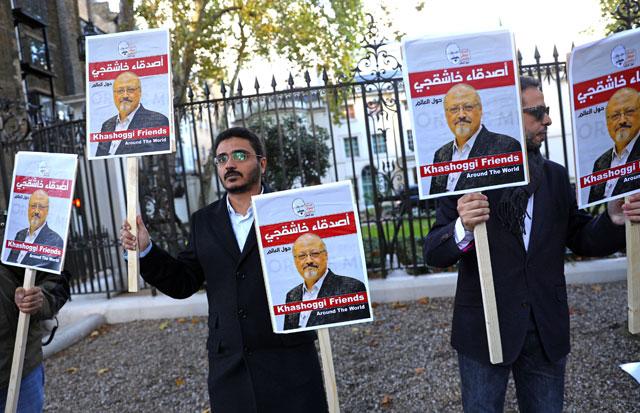You are here
Saudi king orders government reshuffle after Khashoggi fallout
By AFP - Dec 27,2018 - Last updated at Dec 27,2018

In this file photo taken on October 26, 2016, Saudi Finance Minister Ibrahim Al Assaf (right) walks alongside International Monetary Fund Managing Director Christine Lagarde in the Saudi capital Riyadh. King Salman of Saudi Arabia appointed Assaf as the new foreign minister in a government reshuffle on Thursday, a royal decree said (AFP photo)
RIYADH — Saudi Arabia’s King Salman ordered a sweeping government reshuffle Thursday, replacing key security and political figures including the foreign minister, as the kingdom grapples with the international fallout over critic Jamal Khashoggi’s murder.
The surprise shake up saw the appointment of a new National Guard chief and the head of a new space agency, but the ministries of energy and finance were unaffected despite an economic downturn.
The revamp left untouched the authority of Crown Prince Mohammed Bin Salman, the de facto ruler facing intense international scrutiny over the October 2 murder of journalist Khashoggi, which tipped the kingdom into one of its worst crises.
Ibrahim Al Assaf, a former finance minister who was detained last year in an anti-corruption sweep, will replace Adel Al Jubeir as foreign minister, a royal decree said.
Jubeir was effectively demoted to minister of state for foreign affairs, the decree added without explaining the change, as the kingdom appears diplomatically weakened after Khashoggi’s murder.
In other significant appointments, Prince Abdullah Bin Bandar was named chief of the powerful National Guard, and Musaed Al Aiban was appointed the new national security adviser.
The reshuffle would help the crown prince further “consolidate power” as many of those promoted were his “key allies”, Tweeted Ali Shihabi, head of the pro-Saudi think tank The Arabia Foundation.
In other changes, Turki Al Shabanah was appointed as the new information minister, replacing Awwad Al Awwad — who was named as an adviser to the royal court.
Turki Al Sheikh, a close aide to the crown prince, was removed as the head of the kingdom’s sports commission and appointed entertainment authority chief, while Ahmed Al Khatib was named tourism authority chief.
The king also ordered the creation of a national space agency to be led by one of his other sons, Prince Sultan Bin Salman, a former astronaut.
The energy, economy and finance ministries were left untouched even as the kingdom grapples with a sharp fall in crude prices that has generated renewed uncertainty over Prince Mohammed’s Vision 2030 reform programme for a post-oil era.
But the appointment as foreign minister of Assaf, who holds a seat on the boards of state oil giant Aramco and the vast Public Investment Fund, indicates an emphasis on “economic diplomacy” as the kingdom seeks to reassure foreign investors rattled by the Khashoggi crisis, analysts say.
Assaf was held in Riyadh’s Ritz-Carlton hotel last year along with hundreds of elite princes and businessmen, in what the government called an anti-corruption crackdown.
Impact of critic’s murder
The fallout over Khashoggi’s murder is widely seen as the kingdom’s worst diplomatic crisis since the September 11, 2001 terrorist attacks on the United States, in which most of the hijackers were identified as Saudi nationals.
“You cannot delink Khashoggi from any developments, though government reshuffles are customary every four years,” said Mohammed Alyahya, a senior fellow at the Gulf Research Centre.
“The reshuffle saw the appointment of some young princes, but also veteran statesmen to positions of power. There is an effort to balance the fast pace of reform with bolstering government procedures and institutions.”
The shakeup comes after Saudi Arabia last week said it was creating government bodies to boost oversight of its intelligence operations, in the wake of Khashoggi’s murder.
The kingdom has said Khashoggi was killed inside its Istanbul consulate in a “rogue operation” led by Saudi agents, but the CIA reportedly concluded that Prince Mohammed ordered his assassination.
He is set to maintain his political and security posts after Thursday’s reshuffle, including that of defence minster.
Saudi Arabia last week slammed as “interference” a US Senate resolution that held Prince Mohammed responsible for the killing, warning that the move could have repercussions on its strategic ties with Washington.
“The primary bone of contention between Saudi Arabia and American lawmakers is the power of Prince Mohammed and his responsibility for the murder of Khashoggi,” said Ryan Bohl, from the US geopolitical think tank Stratfor.
“This reshuffle doesn’t undercut the crown prince, meaning that those within the US Congress, who want to see his role reduced, will have an argument that further action should still be taken.”
Related Articles
RIYADH — Saudi Arabia’s new foreign minister struck a note of defiance Friday in the face of international outrage over critic Jamal Khashog
ANKARA — Turkey is planning to launch an international investigation into the murder of Saudi journalist Jamal Khashoggi and will
BUENOS AIRES — Saudi Arabia’s Crown Prince Mohammed Bin Salman landed in Buenos Aires on Wednesday for the G-20 summit of industrialised nat













